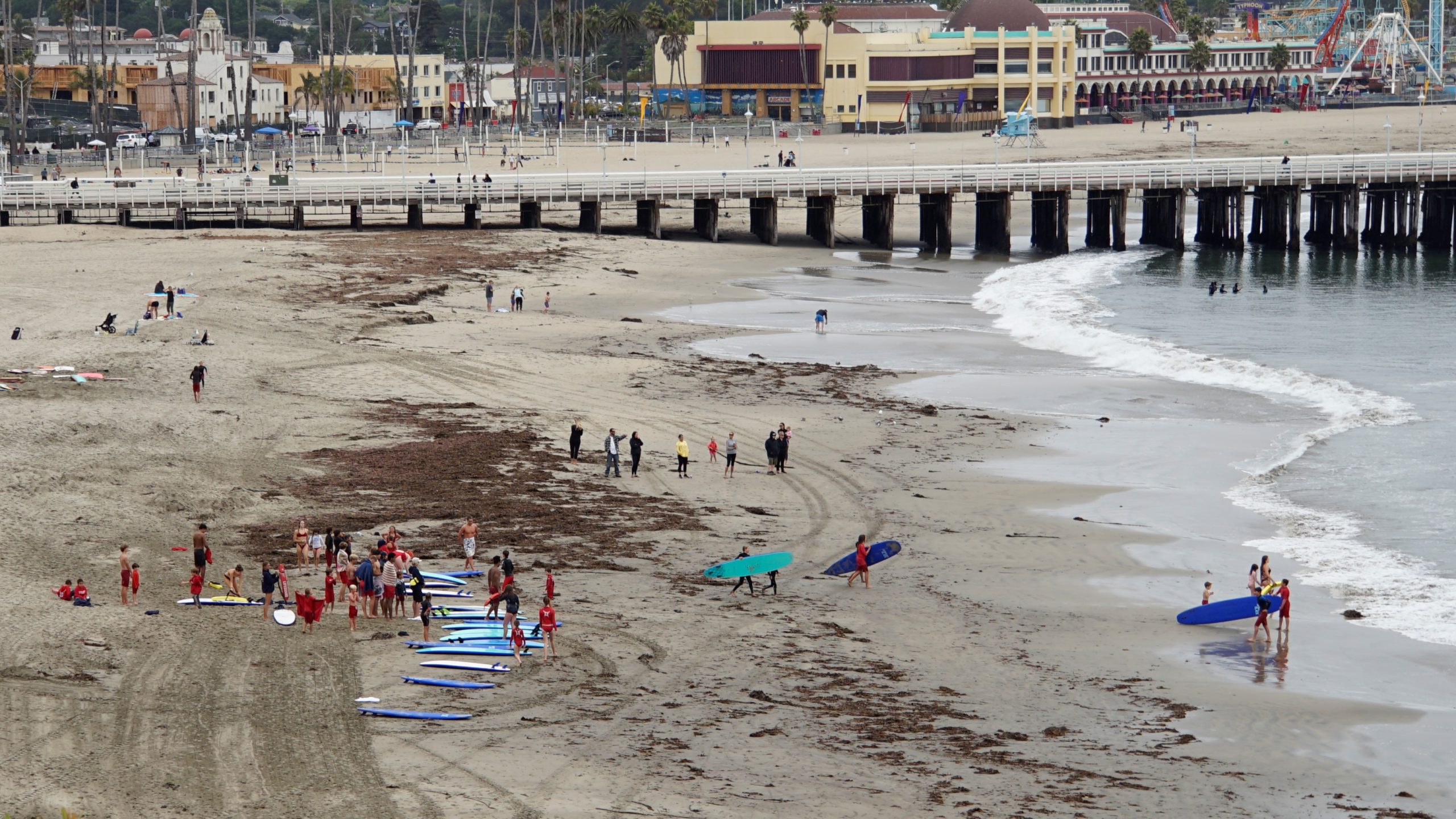
City of Santa Cruz lifeguards teach the Santa Cruz Junior Lifeguards program Friday at Cowell Beach. City lifeguard salaries start at $15.63 per hour, which is less than the city’s minimum wage for outside contractors. (Kara Meyberg Guzman — Santa Cruz Local)
SANTA CRUZ >> After a Santa Cruz City Council member blocked a sales tax measure from the ballot because she wanted a living wage for all city employees, a special city council meeting could be on tap July 27 to reconsider the measure and a wage increase.
The sales tax increase could bring in $6 million annually, city leaders said. It’s being considered in large part because Santa Cruz leaders forecast $1 million to $5 million annual deficits for the next decade.
City staff’s preliminary analyses show that if a living wage were paid to the city’s roughly 300 temporary workers, it could cost up to $1.7 million annually.
According to state law, income from the proposed sales tax increase could not be designated for a specific purpose. It would go to the city’s General Fund, and the city council could change how the proceeds are used.
Special meeting
The council’s rules allow the mayor to give a minimum 24-hour notice to call a special meeting. Mayor Donna Meyers said Friday that she had not formally called the meeting.
A city council committee’s proposal for a 0.5% sales tax increase to 9.75% failed to advance at the council’s June 22 meeting. The proposal will die unless the council can approve it in a special meeting before Aug. 6.
- The proposal would have allowed city voters to consider the tax in the Nov. 2 election.
- The proposal required a unanimous vote to declare a fiscal emergency for the city. The proposal was halted by a “no” vote from Councilmember Sandy Brown. Before her vote, Brown said she could not support the ballot measure without the council’s commitment to higher pay for the lowest-paid city employees.
In recent weeks, Brown has met informally with Councilmember Renee Golder and Vice Mayor Sonja Brunner to draft a proposal for a living wage for city employees. They intend to propose it at the possible special meeting this month.
Friday, Brown said that the group had not figured out the details and hoped to have a proposal in the coming days.
Living wage
City law requires a minimum wage for employees of outside contractors hired by the city. For the fiscal year that started July 1, that “living wage” is $18.10 per hour for employees with benefits and $19.74 per hour for employees without benefits.
That law does not apply to city employees.
There are 12 year-round city jobs that pay less than that living wage, Santa Cruz Human Resources Director Lisa Murphy said Thursday. About five employees are in those jobs, since many of those positions are not filled, she said.
According to data from the Service Employees International Union Local 521 union that represents those workers, positions that make less than the city’s living wage include:
- Parking facilities maintenance assistants who clean the city’s downtown parking lots and garages and collect trash on Pacific Avenue ($17.63 per hour)
- Some administrative assistants ($17.31 per hour)
- Custodians ($17.04 per hour)
Almost all of the city’s 300 temporary and seasonal workers are paid less than that living wage, Murphy said. In a typical year, the city has about 400 to 450 temporary employees.
These positions include:
- Entry-level summer parks and recreation workers ($14 per hour)
- Maintenance worker aides at the Santa Cruz Municipal Wharf ($14 per hour)
- Library aides (around $14 per hour)
- Parking attendants ($16.20 per hour)
To bring the city’s current 300 temporary workers to the city’s living wage would cost around $920,000 to $1.7 million, Murphy’s preliminary spreadsheets show.
Or the cost could be orders of magnitude larger, Murphy said.
Murphy said her calculations do not include increased wages for those workers’ supervisors, which she would recommend. The city’s salary plans include “steps” for each position — wage levels related to performance and length of service. Raising the lowest step to the living wage would increase the higher steps too. As a result, some temporary workers would make more than their supervisors.
“That would be detrimental to the organization to have that. We would probably lose a lot of people,” Murphy said.
Raising wages of those supervisors would increase pension and other benefits costs as well, Murphy said.
All the pay grades within the city’s job classification and compensation system are “interrelated,” Murphy said.
“So just by changing a few employees and a few dollars, it spreads its fingers like wildfire. And that’s what I’m in the middle of right now, is trying to see the links,” Murphy said.
Related stories
- Santa Cruz sales tax hike stalls (June 23, 2021)
- Rising pension costs in Santa Cruz: Your questions answered (June 4, 2021)
Kara Meyberg Guzman is the CEO and co-founder of Santa Cruz Local. Prior to Santa Cruz Local, she served as the Santa Cruz Sentinel’s managing editor. She has a biology degree from Stanford University and lives in Santa Cruz.





